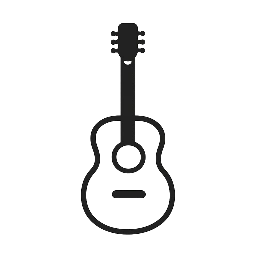Have you ever wondered why playing the opening notes of “Stairway to Heaven” is off-limits in many guitar stores? If you’re a guitarist or just a music fan, this might sound strange.
After all, it’s one of the most famous riffs in rock history. But the truth is, this iconic song has sparked more than just admiration—it has stirred controversy, legal battles, and even a quirky ban that affects musicians like you.
You’ll discover the surprising reasons behind the ban, from mysterious rumors to overplayed frustration. Keep reading to uncover the story behind the “forbidden riff” and why your next guitar session might just avoid those familiar chords.
Backmasking And Satanic Claims
Backmasking and satanic claims surround “Stairway to Heaven,” causing controversy. Backmasking means hiding secret messages when a song plays backward. Some people said this Led Zeppelin classic contains hidden satanic words. These claims sparked fear and debates about the song’s influence. The rumors grew strong enough to affect how stores treat the song today.
Origins Of Allegations
The allegations started in the 1980s. Listeners played parts of the song backward. They thought they heard phrases linked to Satan. The most famous claim was a backward message saying, “Here’s to my sweet Satan.” These messages were never confirmed by the band. Still, the rumors spread quickly through media and word of mouth.
Role Of Televangelists
Televangelists played a big role in spreading fear. They warned viewers about hidden evil in rock music. “Stairway to Heaven” became a prime example. On TV, they said backmasking was a tool to corrupt young minds. Their messages reached millions. This pushed many parents and stores to avoid the song.
Impact On Rock Music Perception
The backmasking claims changed how people saw rock music. Rock was seen as dangerous or linked to dark forces. Many guitar stores banned “Stairway to Heaven” to keep a safe image. Musicians also felt pressure to avoid the song. This fear created a lasting stigma around the track and similar music.

Credit: www.youtube.com
Copyright Lawsuit Details
The copyright lawsuit involving “Stairway to Heaven” has played a key role in its ban at guitar stores. This legal battle focused on whether Led Zeppelin copied parts of another band’s work. The case raised many questions about music originality and ownership. It also highlighted how copyright laws affect artists and fans alike.
Understanding the lawsuit details helps explain why guitar stores avoid allowing customers to play this iconic song. The controversy is not just about music but also legal rights and ethics. Below, we explore the main points of this lawsuit.
Spirit’s ‘taurus’ Vs Led Zeppelin
The lawsuit centered on the similarity between Led Zeppelin’s “Stairway to Heaven” intro and Spirit’s 1968 song “Taurus.” Spirit’s guitarist claimed Led Zeppelin copied the guitar riff without permission. Both songs share a descending arpeggio pattern, which sparked the dispute. Spirit argued this part of “Taurus” was unique and original.
Led Zeppelin denied copying and said the riff was common in folk music. The case drew attention to how much influence one song can have on another. It raised the question of where inspiration ends and copying begins.
Legal Proceedings And Verdict
The legal battle began in 2014, years after “Stairway to Heaven” was released. The court examined music experts’ opinions and the songs’ sheet music. Evidence was presented about when and how Led Zeppelin members heard “Taurus.”
In 2016, the court ruled in favor of Led Zeppelin, saying the two songs were not substantially similar. This verdict was appealed, and the case reached the Ninth Circuit Court of Appeals. In 2020, the higher court upheld the original decision, confirming Led Zeppelin did not infringe the copyright.
Despite the verdict, the lawsuit left a lasting impact on the music world. It showed how complex copyright claims can be and how they affect famous works.
Debate On Inspiration Vs Plagiarism
This case opened a big debate about what counts as inspiration or plagiarism in music. Many musicians use similar chords and riffs. Some argue that common musical phrases belong to everyone. Others believe copying unique parts without credit is wrong.
The “Stairway to Heaven” lawsuit made artists more cautious. It also made fans aware of copyright rules in music. This debate continues as new songs sometimes resemble older ones. It challenges creators to balance creativity and respect for others’ work.
Overplay In Guitar Stores
The famous opening riff of “Stairway to Heaven” is heard too often in guitar shops. Many players learn it early. They practice it repeatedly. This constant repetition causes annoyance. Store owners grow tired of the same tune. It turns into a common sound everywhere. This overplay led to a new rule in many stores. They banned the riff to keep peace.
Rise Of The Forbidden Riff
The “Stairway to Heaven” riff became known as the “forbidden riff.” It rose in popularity quickly. Players of all skill levels try it out. The riff is easy to recognize and fun to play. Soon, it filled every guitar store’s room. The overuse made it lose its charm. Instead of a cool challenge, it became a cliché. This reputation gave the riff a new nickname.
Guitar Store Ban Phenomenon
Many guitar shops placed signs banning the riff. This happened in the 2000s and continues today. Shops want to stop players from repeating the same song. The ban helps reduce noise and frustration. It also encourages players to explore new music. The rule is not official everywhere. Still, many stores enforce it strictly. This trend spread worldwide among guitar retailers.
Musician And Customer Reactions
Musicians have mixed feelings about the ban. Some agree it prevents boredom and noise. Others feel it limits freedom and fun. Customers often laugh when they see the ban sign. It has become a part of guitar store culture. Some players even try other riffs to avoid trouble. The ban pushes creativity in music selection. It changes how people experience guitar shopping.

Credit: www.youtube.com
Cultural And Media Impact
The cultural and media impact of “Stairway to Heaven” plays a big role in its ban in guitar stores. The song is famous worldwide and has been part of music history for decades. Its popularity has shaped how people see and interact with it.
The song’s constant presence on radio and its influence on popular culture create a mix of admiration and frustration. This dual effect adds to why many guitar stores avoid allowing players to try it out.
Radio And Popularity Effects
“Stairway to Heaven” has been played heavily on radio stations since the 1970s. It became a symbol of classic rock and guitar mastery. Many listeners recognize its intro instantly.
This overexposure leads to fatigue among listeners and players. Guitar stores face repeated requests to play the song. It causes noise complaints and disrupts the store’s environment.
Store managers want to keep peace and offer variety. Banning the song helps reduce repetitive noise and keeps the atmosphere friendly for all customers.
Memes And Social Media References
The song’s ban inspired many jokes and memes online. Social media users often share funny clips about the “forbidden riff.” This keeps the song in public conversation.
Memes highlight how often people try to play the song in stores. They show the frustration of staff and the stubbornness of guitar players. This viral content spreads awareness about the ban.
Social media also fuels curiosity about the ban. New players learn about the song’s legendary status and the reasons behind the restriction. It creates a cultural myth around “Stairway to Heaven.”
Alternative Interpretations
Alternative interpretations add depth to the story behind “Stairway to Heaven.” The song is often seen through many lenses beyond its musical fame. These views help explain why it holds such a unique place in music culture.
Each interpretation offers a different way to understand the lyrics and melody. Some see spiritual meaning, while others find social commentary or hidden messages. These ideas shape how people connect with the song.
Spiritual And Allegorical Views
Many listeners believe the song carries spiritual messages. It speaks about a journey toward enlightenment or a higher place. The “stairway” symbolizes a path to heaven or inner peace. This allegory touches on themes of hope and self-discovery. Such meanings give the song a timeless and mystical feel.
Lyrics As Commentary On Fame
Some see the lyrics as a critique of fame and materialism. The song warns against chasing wealth and status at the cost of true happiness. It describes a woman who “buys a stairway to heaven,” hinting at false values. This view highlights the emptiness fame can bring. It makes the song relevant to many who question society’s priorities.
Drug Use Metaphors
Others interpret parts of the song as metaphors for drug use. Certain lines may hint at altered states or the search for escape. This idea fits with the era when the song was written. It reflects the culture of experimentation and the struggles it brought. These metaphors add a darker, more complex layer to the lyrics.
Legacy And Continued Controversy
The legacy of “Stairway to Heaven” is complex and full of debate. This song by Led Zeppelin is one of the most famous rock songs ever. Yet, it has faced bans in many guitar stores. These bans reflect its continued controversy and impact on music culture.
The song’s story does not end with its release. It still sparks strong feelings among musicians and fans. The reasons for the ban go beyond just copyright issues. They touch on the song’s lasting popularity and the arguments it inspires.
Enduring Popularity
“Stairway to Heaven” remains a favorite among guitar players. Many try to learn its iconic intro despite the ban. The song’s melody and structure attract beginners and experts alike. It has become a symbol of classic rock and guitar skill. This popularity keeps the song alive in music stores and homes.
Ongoing Debates Among Fans
Fans often argue about the song’s true meaning and originality. Some claim Led Zeppelin copied parts from another band. Others discuss the alleged hidden messages when played backwards. These debates keep the song in public discussion. They add to the mystery and controversy that surround the track.
Influence On Music Culture
“Stairway to Heaven” shaped how people seeguitar playing. It pushed guitarists to improve their skills and creativity. The song also influenced many other artists and bands. Its ban in stores shows how powerful and divisive it remains. The song’s impact on music culture is still strong today.

Credit: www.reddit.com
Frequently Asked Questions
Why Is Stairway To Heaven So Controversial?
“Stairway to Heaven” is controversial due to alleged satanic backmasking, a major copyright lawsuit, and its overplay in guitar stores. These issues sparked debates about hidden messages, plagiarism, and musician frustration, earning it the nickname “The Forbidden Riff” among players and fans.
Is There A Legal Issue With “stairway”?
“Stairway to Heaven” faced a copyright lawsuit but was cleared. No current legal issues exist, though some guitar stores ban its riff due to overplay.
What Is The Forbidden Song In Guitar Stores?
The forbidden song in guitar stores is “Stairway to Heaven. ” Stores ban it due to overplay and annoyance. Its riff became a cliché, frustrating staff and customers. The ban helps maintain a pleasant shopping environment and encourages players to explore new songs.
What Happens If You Play Stairway To Heaven In A Guitar Store?
Playing “Stairway to Heaven” in a guitar store often annoys staff and customers due to its overuse. Many stores ban it to avoid repetitive play and maintain a pleasant atmosphere. This riff is famously called the “forbidden riff” because of its frequent, tiresome presence in music shops.
Conclusion
The ban on “Stairway to Heaven” in guitar stores has many reasons. Some see it as overplayed and tiring to hear. Others mention the past legal issues about its melody. Some even talk about strange rumors around the song. This mix made stores stop allowing it.
Musicians now choose different songs to play and enjoy. The story shows how music and culture can clash sometimes. It also reminds us that every song has its own history. What matters most is the joy music brings to each player.

Senior Music Reviewer
Alex Carter is a seasoned music reviewer with over a decade of experience in the world of sound and instruments. Passionate about helping musicians and enthusiasts make informed choices, he brings sharp insights and in-depth knowledge to every review. From classical instruments to modern gear, Alex combines technical expertise with a love for music to deliver content that resonates with readers.
As a Senior Music Reviewer and expert author on Tuneluma.com, Alex is dedicated to sharing honest evaluations, practical advice, and thoughtful commentary to guide readers in their musical journey.


Leave a Reply